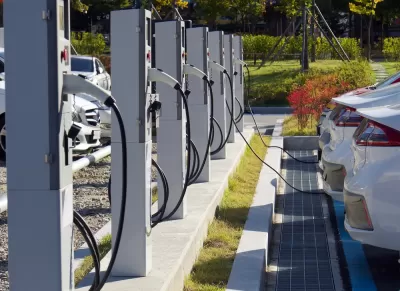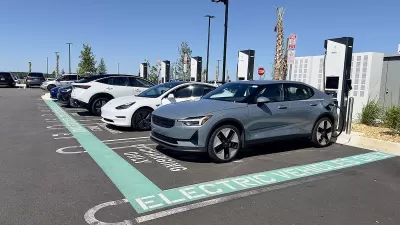A lack of regulations and zoning codes tailored to electric vehicle charging infrastructure is hindering the proliferation of charging stations.

According to a new report from the Fuels Institute Electric Vehicle Council, the widespread proliferation of electric vehicle charging stations is being stymied by outdated or nonexistent state and local policies.
As Dan Zukowski explains in Smart Cities Dive, less than half of 100 cities surveyed in 2021 had ordinances related to EV charging, and “As of 2020, 10 states had adopted installation-related policies and five had operations-related policies.”
Regulations, or the lack thereof, vary widely across the country. In some cities, new construction is required to accommodate EV charging infrastructure. Others have created online portals to streamline permitting, but many providers still wait as long as two years for a permit. “Local policies often include requirements for parking and signage; design, installation and technical issues; EV-ready building codes; and permitting specific to non-residential charging stations. EV-ready parking spaces include a junction box or 240-volt outlet.”
While some cities have made encouraging efforts, the piecemeal approach to EV charging station permitting and regulation leads to long wait times for permits and an overreliance on outdated regulations designed for fuel storage tanks and gas station infrastructure. The report recommends targeted efforts to streamline zoning and planning codes, improve coordination among different levels of government, and create EV-specific regulations and building codes.
FULL STORY: EV charging station rollout hampered by outdated state, city regulations: report

Alabama: Trump Terminates Settlements for Black Communities Harmed By Raw Sewage
Trump deemed the landmark civil rights agreement “illegal DEI and environmental justice policy.”

Planetizen Federal Action Tracker
A weekly monitor of how Trump’s orders and actions are impacting planners and planning in America.

The 120 Year Old Tiny Home Villages That Sheltered San Francisco’s Earthquake Refugees
More than a century ago, San Francisco mobilized to house thousands of residents displaced by the 1906 earthquake. Could their strategy offer a model for the present?

In Both Crashes and Crime, Public Transportation is Far Safer than Driving
Contrary to popular assumptions, public transportation has far lower crash and crime rates than automobile travel. For safer communities, improve and encourage transit travel.

Report: Zoning Reforms Should Complement Nashville’s Ambitious Transit Plan
Without reform, restrictive zoning codes will limit the impact of the city’s planned transit expansion and could exclude some of the residents who depend on transit the most.

Judge Orders Release of Frozen IRA, IIJA Funding
The decision is a victory for environmental groups who charged that freezing funds for critical infrastructure and disaster response programs caused “real and irreparable harm” to communities.
Urban Design for Planners 1: Software Tools
This six-course series explores essential urban design concepts using open source software and equips planners with the tools they need to participate fully in the urban design process.
Planning for Universal Design
Learn the tools for implementing Universal Design in planning regulations.
Clanton & Associates, Inc.
Jessamine County Fiscal Court
Institute for Housing and Urban Development Studies (IHS)
City of Grandview
Harvard GSD Executive Education
Toledo-Lucas County Plan Commissions
Salt Lake City
NYU Wagner Graduate School of Public Service





























